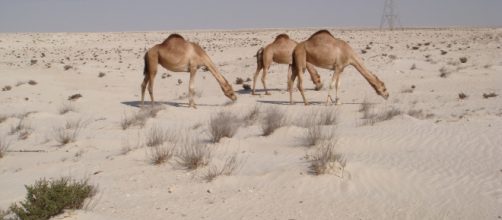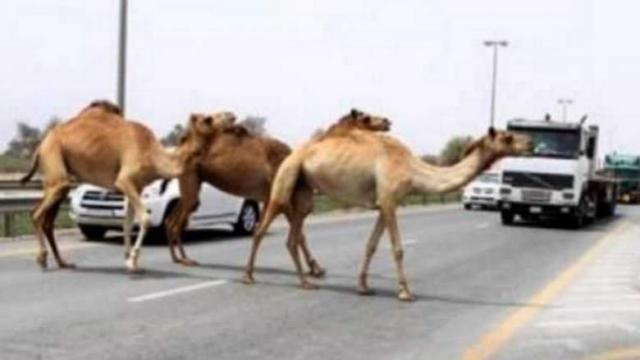Saudi Arabia’s foreign policy took a surreal twist in September as the Gulf nation outlawed all foreign livestock from grazing on its land for the next five years. Although ostensibly a part of Crown Prince Mohammad bin Salman’s Vision 2030 plan to conserve natural resources and safeguard the environment, in reality the decree reads more like a pointed jab at the kingdom’s estranged neighbour, Qatar.
The peninsular state has been ostracized by much of the Arab community since June last year, when Saudi Arabia initiated a blockade and severed all land, sea and air communications with the country.
While Qatari camels and sheep might be the most recent casualty of the Crown Prince’s increasingly aggressive attitude to foreign diplomacy, the move is indicative of a deeper-seated intolerance and intransigence which belies the progressive façade that Vision 2030 purports to paint.
Camels, canals and castigation
The recent ban on foreign animals might sound cartoonish to Western ears, but it will have tangible ramifications for farmers and their livestock on the Qatari side of the border. Though just 4,400 square miles in size, Qatar currently has over one million camels and sheep and little ground upon which they can graze. As a result, farmers have traditionally looked to their neighbour – almost 200 times greater in size – for help, renting patches of land for grazing purposes.
That arrangement came to a crashing halt last June. After Saudi Arabia along with Bahrain, Egypt, the United Arab Emirates and Yemen began the Qatari blockade, they also demanded all Qatari livestock leave their country immediately. With the majority of their owners still in Qatar and border crossings only open during select hours each day, the process of repatriating over 25,000 camels and sheep was an extensive and arduous one which hundreds of dromedaries did not survive. Almost a full year into the diplomatic crisis, in March of this year, thousands of camels were still trying to return home through Kuwait.
The offensive is part of an attempt to force Qatar to cede to a lengthy list of demands for perceived immoral behaviour.
These include a few reasonable requests, such as formally declaring the Islamic State (ISIS) a terrorist organization, as well as a host of more dubious ones, like the decommissioning of news outlet Al Jazeera. Able to fall back on its extreme wealth, Qatar has so far held out and focused on building infrastructure and new trade routes, causing Saudi Arabia to push forward on plans to isolate the country geographically as well as diplomatically.
At the beginning of September, officials announced they were investigating the possibility of digging a 200m wide, 60km long canal along the Saudi-Qatari border, effectively turning the latter country into an island. There are also suggestions of converting part of the canal into a military base and a dumping ground for nuclear waste.
Trudeau in the doghouse
The Crown Prince’s reactionary approach to foreign diplomacy is hardly limited to Qatar. Canada has spent the last two months trying to pour cold water on the increasingly incendiary relations between the two countries. The unusual spat arose after Canada’s foreign minister published several tweets questioning the legality of the Saudi state’s detention of several prominent women’s rights activists.
Not surprisingly, the Saudi reaction was sharp. At once, Saudi authorities expelled the Canadian Ambassador from the kingdom, called an immediate halt to all trade deals between the two nations and criticized the Canadian government on social media, as well as withdrawing thousands of Saudi students from medical courses in the North American country.
The move not only throws the lives of the students into disarray, but also jeopardizes the Canadian healthcare system, which relies heavily on Middle Eastern investment and expertise to sustain itself.
There have been other bizarre attempts to reprimand Canada. Several media platforms have publicized factually inaccurate stories about Canada’s own human rights record, claiming 75% of prisoners die before trial and women are treated worse in Canada than anywhere else in the world. Meanwhile, a Twitter account linked to the Saudi government published a post apparently threatening Toronto with a 9/11-style attack while a sudden social media surge of support for Quebecois secession added another layer of ludicrousness to the feud.
Even if the 9/11-style Tweet was later apologetically removed, the Saudi over-reaction to a fairly mundane tweet from the Canadian foreign office is reminiscent of a similar approach to foreign policy the kingdom took back in 2015. At that time, Sweden took a stand for women’s rights and freedom of expression. It appears that when the diplomatic blueprint of buying Western silence through lucrative arms deals falls through, plan B consists of bullying and bravado.
Vision 2030: an ever-more unconvincing veneer
Although recent developments may have a stranger-than-fiction air about them, there’s no denying they have very real negative impacts on ordinary citizens of the countries which fall afoul of Saudi sensibilities.
For thousands of Qatari households, the death of a camel can amount to the loss of their worldly savings, while Saudi citizens studying abroad in Canada have been reduced to hastily selling off their belongings before they are forced to return home.
This approach to foreign affairs is indicative of the fact that the kingdom’s praised Vision 2030 is not the reformist dream it is portrayed to be. While on the one hand, the Crown Prince has claimed responsibility for "empowering women" by granting them the right to drive and attend sports events, he has simultaneously detained over a dozen female rights activists without trial since the law passed. In effect, Vision 2030 is saying all the right words when it comes to liberalizing and modernizing the country, but the Crown Prince’s imperious actions speak far louder.




